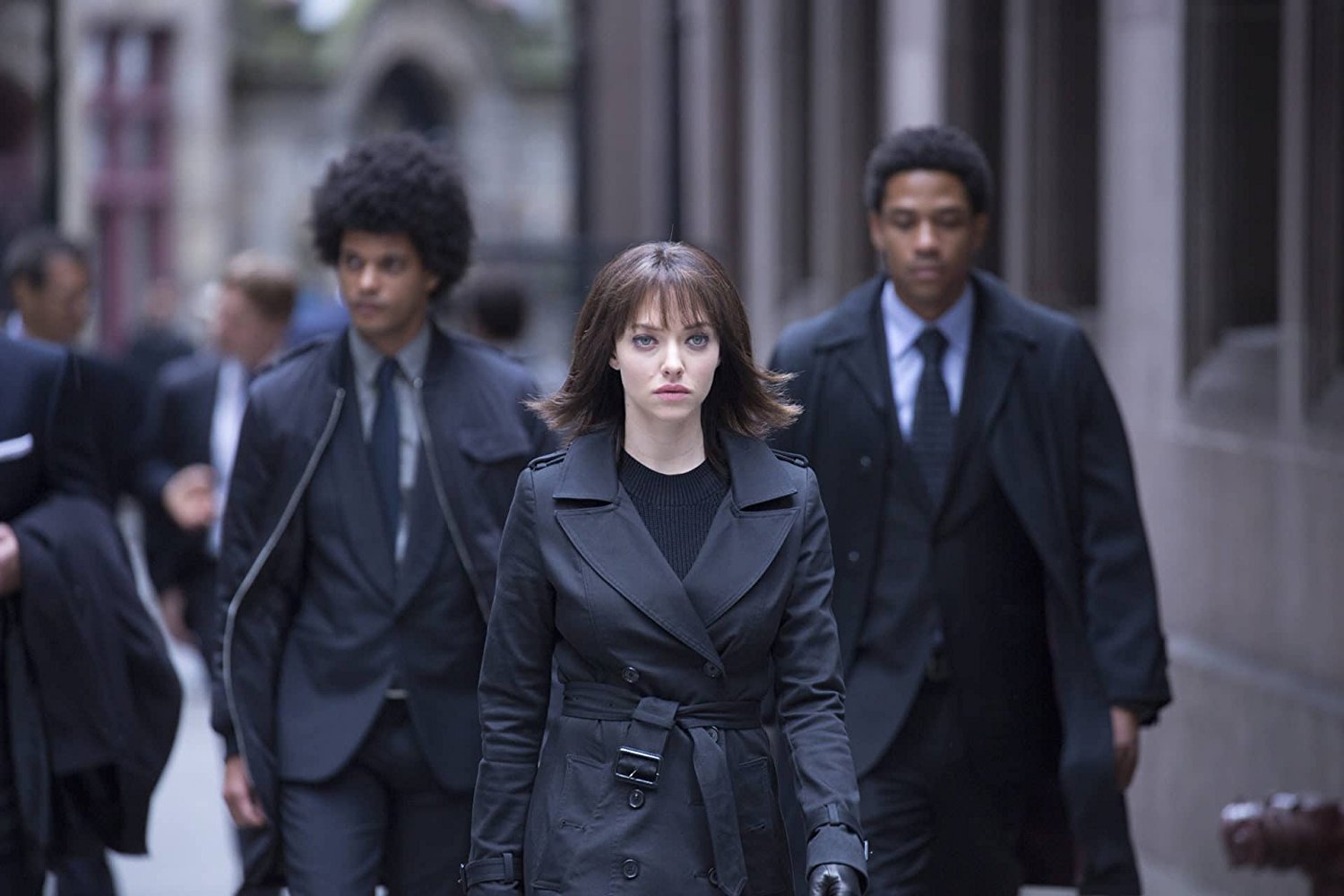Reviewed by Zoe Margolis
Shot in a monochromatic, desaturated style, ANON offers a dulled vision of a near-future where no one has any secrets, or privacy. Unlike now, where people voluntarily upload personal information to social media platforms (or involuntarily, as is the case with Cambridge Analytica’s exploitation of Facebook content), citizens of this society appear to have no choice as to how their data is accessed. Instead of mobile devices capturing events, human beings have biological computer implants – a “Mind’s Eye” – which work as personal video recorders, enabling others to witness their point of view (POV), similar to Strange Days’ S.Q.U.I.Ds. In ANON this happens without the use of external equipment: the brain itself has become a shareable hard drive. Whilst this means people can return to any moment of their life that they wish to, the recording of every millisecond is downloaded to a vast grid called The Ether which law enforcement can access, so nothing anyone does or says is private.
The film opens with us viewing Sal Frieland (Clive Owen)’s POV: everywhere he looks, text is overlaid onto his perspective. When he sees people on the street, information about their jobs, age, height and weight appears; as he stops to get food from a street truck, he sees the calorific content of what he chooses to eat; when he walks past a store selling watches, a holographic watch appears on his wrist with its price. With no screens at all in the film – no phones, no tablets, no TVs, and people using reflections (in glass or mirrors) to make POV phone calls – this in-brain blend of augmented reality (AR) and virtual reality (VR) seems captivating, but one gets the feeling that for its citizens it’s overwhelming and invasive; there is no opt-out from the relentless stream of information sent and received.

Frieland is a detective. Bored by reviewing everyone’s Mind’s Eye viewpoints, there is almost no crime for him to solve: with no anonymity in this future, few crimes take place. However, he stumbles on to a series of murders which appear to be linked: the killer has somehow managed to hack into their victims’ Mind’s Eye and alter what they see. The victims’ POVs are of the murderer’s: they view their own death, not a view of the killer. The hacker-killer then wipes the victims’ histories from The Ether, so they leave no digital footprint, and no meta trail of who they are. They are completely anon. Frieland encounters a mysterious woman (Amanda Seyfried) whose info is strangely hidden from his Mind’s Eye, and he suspects she is involved in the killings. With pressure from his superiors at the police force to solve the case, Frieland agrees to act as bait by assuming a new identity, and hopes he can entrap and catch the killer before they kill again.

Written and directed by Andrew Niccol (Gattaca, The Truman Show), ANON offers an interesting analysis of the relationship between technology and humanity, and how privacy impacts us all. But for a story focused on the importance of a POV, it’s remarkable that the only perspective that matters in ANON is that of men; the male gaze is dominant throughout. Niccol chooses to signpost his narrative with totally unnecessary, and frequent, gratuitous female nudity. There is a lesbian scene which is basically soft porn, complete with terrible dialogue and acting, and purely there for titillation; its inclusion was jarring. The film reinforces the sexist and ageist double standard of how sex and sexual desire is represented on screen: over the course of 90 minutes, five young (all the actresses are in their 20s or early 30s) women have their breasts on display, but even though Owen (age 53) has sex scenes with three of them, he never even takes his top off. Throughout the film, the camera tilts slowly up and down over women’s bare breasts, offering up regular female flesh on a platter for the assumed-male audience, and there is no critique of this, either within the narrative or by any character. Female nudity is purely there to be consumed; it’s just masturbation fodder for men – it does absolutely nothing to drive the plot.

Whilst the muted palette and hand held cinematography by Amir Mokri was notable, and the production Phil Ivey’s design with its Brutalist architecture, and 70s-style vintage cars combined with futuristic tech was beautiful, and the VFX (Craig Lyn) was also very impressive, ANON is ultimately let down by its director’s poor vision, and sexist objectification. If you’re going to attempt a futuristic film noir, complete with a femme fatale, then you should be trying to modernise the genre by breaking a few rules. Perhaps if Niccol had gender-flipped his characters, with a 53 year old female detective who stays fully clothed, and who has sex with a bunch of 20-something men who all take their clothes off, then he’d have offered something different to this genre, but ANON just rehashes tired, old-fashioned, sexist tropes, and after a while, even the fancy imagery isn’t enough to save this dull film.
Director: Andrew Niccol
Writer: Andrew Niccol
Stars: Clive Owen, Amanda Seyfried, Colm Feore
ANON will be released in UK and Irish cinemas and on Sky Cinema from May 11

Comments are closed, but trackbacks and pingbacks are open.